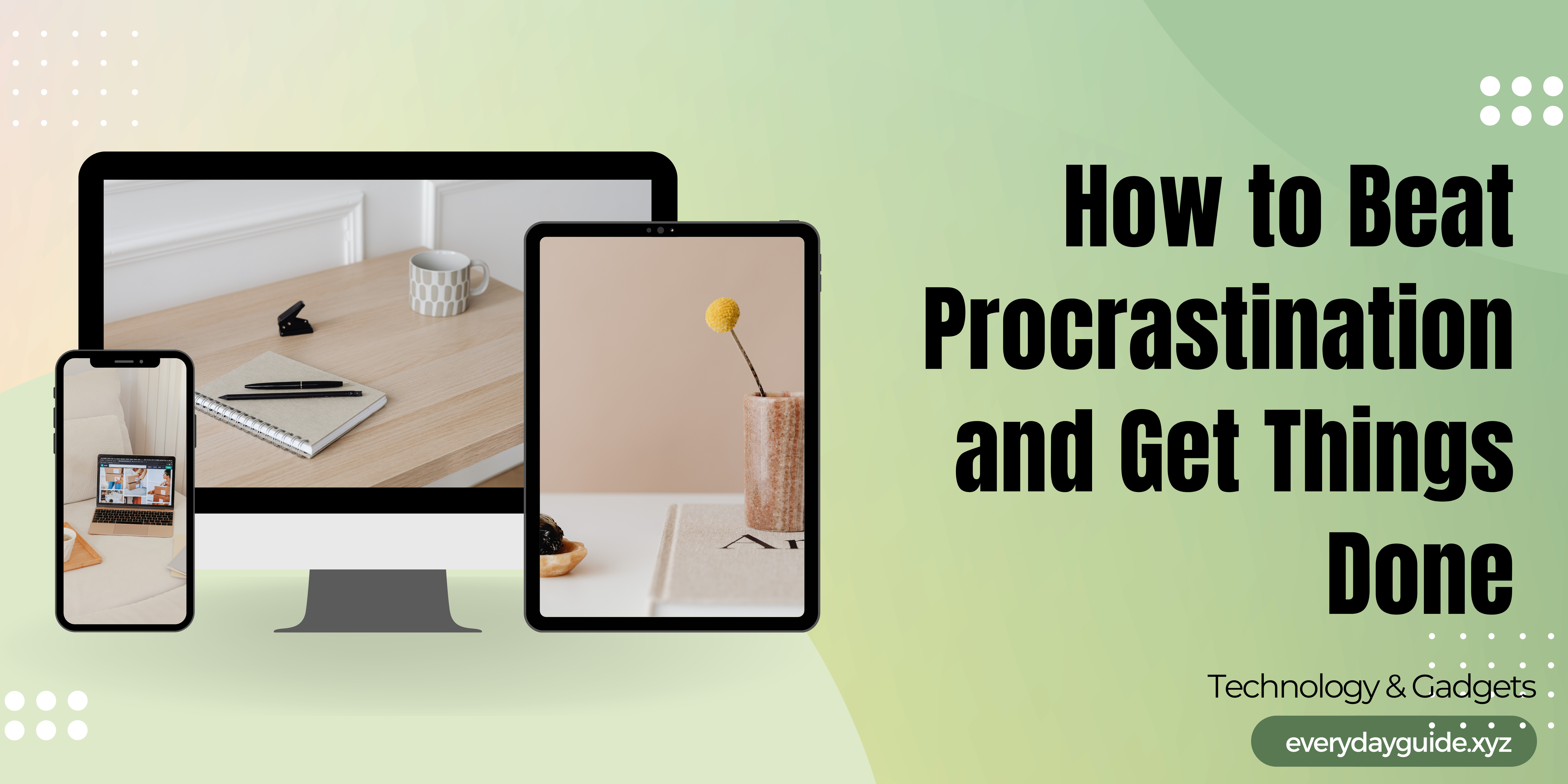Procrastination is something that happens to all of us, and it often creates extensive stress, missed deadlines, and wasted opportunities. By learning more about how to avoid procrastination, you will have a better shot at staying productive and making sure that success can follow. This article will delve into successful techniques and practices that can help you defeat procrastination, improve your time management, and increase your productivity.
What we now delve down into is essentially unsought that why do people procrastinate the most common causes of procrastination and its adverse impacts on life.
Not only is procrastination a terrible thing in and of itself, but it is usually also the end result of a number of more nuanced psychological and behavioral issues. Identifying which of these root causes affects you is the most crucial part in being able to tackle them effectively.
The deeper reasons for procrastination

From a psychological perspective, procrastination can be caused by fear of failure, perfectionism or lowered self-esteem. They can create an environment where people stop tasks just to avoid the possibility of failing not meeting standards. Perfection often results in procrastination as people might withhold initiating a task, fearing they won’t be able to deliver their best while completing it. Furthermore, having low self-esteem can depreciate motivation and decreased confidence in competency to get any task done.
The Patterns of Procrastination
Behavioral patterns also contribute to procrastination. Examples of these behaviors include task aversion, in which the perceived effort of a task exceeds its perceived benefit, and distraction, whereby individuals prioritize other activities over those salient to their value systems. Bad time management: Procrastination often occurs when you have difficulty setting your priorities or fulfilling your schedule.
Best Ways to Fight Procrastination

To eliminate procrastination from our lives, it is necessary to apply powerful strategies. These Different methods are very helpful to time management, concentration enhancement and productivity improvement.
STUDY TIP 5: Keep Goals Clear and Attainable
Setting clear and realistic goals is one of the best defense mechanisms against procrastination. Separate the larger tasks in to the smaller steps and determine a specific deadline for each. This not only makes tasks appear less formidable but also permits you to keep a monitor of your development (however little it may be) and excite you further. SMART (Specific, Measurable, Achievable, Relevant, Time-bound) goals is a method that will let you know that you have set clear and quantified targets.
Use Time Management Practices
Techniques like the Pomodoro Technique, time blocking and the Eisenhower Matrix will help you a lot to improve productivity. In this technique, we work for short amounts of time followed by short breaks which will help us to maintain focus on the topic and saves from burning out. Time chunks reserve specific windows for individual tasks to ensure that they receive the degree of focus needed. They help you assess the urgency and importance of tasks so that you spend more time in the quadrant with activities which are important.
Make Your Workspace Work For You
(Now to discover the following noise in an effective work environment may any dimwit also acquire things done1). Have a clean, well-organized and distraction-free work place Other things you get from personalizing are they create a pleasant and work-friendly environment in the light of your own preferences. This can be anything from having ergonomic furniture installed, to placing quotes in your sight or wearing some noise-canceling headphones to lower distractions.
Mental health effects of procrastination: An insight
Cognitive implications of procrastination are a real concern. Constant procrastination has the side effect of leading to more stress, anxiety and guilt. Knowing these effects can help inspire us to address procrastination well.
Here’s a table showing Procrastination and its Psychological Repercussions:
| Aspect of Procrastination | Psychological Repercussions |
|---|---|
| Avoidance of Tasks | – Increased anxiety as tasks pile up. – Guilt over missed deadlines or poor performance. |
| Fear of Failure | – Lowered self-esteem due to constant self-doubt. – Perfectionism, leading to chronic dissatisfaction. |
| Decision Paralysis | – Overwhelm and indecision, creating mental fatigue. – Reduced confidence in one’s abilities. |
| Chronic Delaying | – Stress from last-minute rushes. – Declining mental well-being from continuous time pressure. |
| Distraction-seeking Behavior | – Decreased focus and productivity. – Feelings of regret for wasted time. |
| Short-term Relief | – Temporary avoidance may lead to a sense of comfort. – Long-term build-up of anxiety and stress. |
| Self-sabotaging Patterns | – Reinforced negative self-image (“I’m lazy,” “I’ll never succeed”). – Increased feelings of helplessness. |
| Lack of Motivation | – Feelings of hopelessness and lack of direction. – Leads to depression and frustration over unmet goals. |
| Diminished Sense of Accomplishment | – Loss of personal fulfillment and pride. – Reduced self-worth and feelings of incompetence. |
| Isolation from Others | – Social anxiety from uncompleted promises. – Guilt leading to avoidance of social interactions and support. |
The stress and procrastination cycle is well documented. Procrastination can arise when individuals avoid a task to escape stress. Stress over tight deadlines further exacerbates the urgent need for completion of a given task in order to achieve efficiency. Such avoiding makes the stress levels even higher leading to a vicious circle of never-ending suffering. To break this cycle, you are going to learn how to cope with stress and manage our time properly which are tools that will help in ensuring ultimate productivity.
Support for Mental Health and Coping Mechanisms
Procrastination isn’t just about behavior change, it’s about confronting psychological impacts. Some of these methods include mindfulness, cognitive-behavior therapy (CBT), and professional support from mental health care professionals. Know that mindfulness can aide in stress management and focus, and CBT is helpful at addressing those cognitive distortions related to procrastination.
When you are working from home, your tools are going to be key help to stop procrastination and to increase productivity. If you want to stay on track, here are some tools and resources for that.
B2B — The Software of Productivity Apps
From productivity apps to help you manage your tasks and time efficiently. Use tools like Trello,Asana or Todoist to help you list down what needs to be done and put deadlines as well. Many of these apps come with tools for working together, reminders, and efficiently managing tasks visually to improve productivity and ensure timeliness.
Time Management Systems
Utilizing time management systems like the Getting Things Done (GTD) method or the Time Blocking Method can help you organize your tasks more effectively. GTD is about collection of all tasks, and making to-do items out of them; Time Blocking deals with assigning time slots for specific activities to ensure periods of focused work.
Categorised Book and Courses on Productivity
As a matter of fact, there are tons of books and online classes that can teach you the nitty-gritties to get over procrastination and become more productive. The Top books here e.g. Atomic Habits direct link: Atomic Habits | James Clear Deep Work direct link:Deep Work by Cal Newport You can also take online courses and workshops on platforms like Coursera, Udemy or Linkedin Learning to gain insights and learn tools to help you up your productivity game.
How to Train Yourself to Stop Procrastinating
Cultivating good habits is the best way to avoid procrastination, and time wastage in general, over an extended period. Creating habits and engaging in new behaviors daily can keep you on the right path towards your goals.
Also Read More:
- 5 Mistakes That Are Costing You Money
 It is these small mistakes that can add up in time to amount to huge sums, and this is why being more careful with your personal finance is the key to long-term success. This blog is about, 5 Financial Mistakes Most… Read more: 5 Mistakes That Are Costing You Money
It is these small mistakes that can add up in time to amount to huge sums, and this is why being more careful with your personal finance is the key to long-term success. This blog is about, 5 Financial Mistakes Most… Read more: 5 Mistakes That Are Costing You Money - 7 Easy Ways to Save Money on Your Daily Commute
 Getting to and from work or school every day can eat a huge chunk of your budget without even realizing it. Thankfully, there are several simple money saving techniques you might have overlooked while driving to work every day. Whether that… Read more: 7 Easy Ways to Save Money on Your Daily Commute
Getting to and from work or school every day can eat a huge chunk of your budget without even realizing it. Thankfully, there are several simple money saving techniques you might have overlooked while driving to work every day. Whether that… Read more: 7 Easy Ways to Save Money on Your Daily Commute - 7 Tips for Saving Money While Shopping Online
 It is the era of digitalization and shopping online has now turned into an instant process to get desired things. Online shopping is great in terms of convenience but it has its downsides as well, mainly the case of overspending. Look… Read more: 7 Tips for Saving Money While Shopping Online
It is the era of digitalization and shopping online has now turned into an instant process to get desired things. Online shopping is great in terms of convenience but it has its downsides as well, mainly the case of overspending. Look… Read more: 7 Tips for Saving Money While Shopping Online - How to Cut Your Grocery Bill in Half
 Estimating your home grocery bill can be challenging with changing food prices and varying household requirements. Well, if you’ve been looking for some actual ways to slash your grocery bill in half… this is the post for you. To facilitate and… Read more: How to Cut Your Grocery Bill in Half
Estimating your home grocery bill can be challenging with changing food prices and varying household requirements. Well, if you’ve been looking for some actual ways to slash your grocery bill in half… this is the post for you. To facilitate and… Read more: How to Cut Your Grocery Bill in Half - 8 Easy Decluttering Tips for Busy People
 With today being so fast paced clutter can creep in as a creeping vine, making it difficult to be organized and focused. When you are a busy person, clutter can seem daunting to deal with but it need not be so.… Read more: 8 Easy Decluttering Tips for Busy People
With today being so fast paced clutter can creep in as a creeping vine, making it difficult to be organized and focused. When you are a busy person, clutter can seem daunting to deal with but it need not be so.… Read more: 8 Easy Decluttering Tips for Busy People
How to create a routine that sticks
This will help in your ability not to procrastinate as well teaching you discipline which we will get into. Have a regular wake-up and sleep schedule, structure your work and rote activities in a more systematic way. Regularity in the daily schedule can strengthen good habits and time consuming.
Procedures on Self-Care and Wellbeing
Makeup — You know the drill ↠ Self-care is key for productivity to avoid procrastinating. Get more sleep, exercise more often, and practice activities that reduce stress and improve mental health. Performing self-care activities can combat stress, boost energy, and improve your attitude.
Creating Accountability>null
Many times accountability will help in coming out of procrastination. Find accountability partners or groups where you can let others know your goals and how well you are progressing. Continuous reinforcement can help motivate you and instantly tell you how far you are from finishing all of your deliverables.
Conclusion
This also means that the way to beat procrastination and get things done is not a one-size-fits-all model but rather involves delving into: Improving your productivity goes far beyond attending productivity hacks but also addressing the psychology, time management techniques and building habits to become more productive in your life. Just know that tackling procrastination is an ongoing endeavour, requiring great self-awareness, determination and regular action. In this guide, learn how you can take charge of your productivity and gain a life that is more fulfilling and successful by using the right methods.

